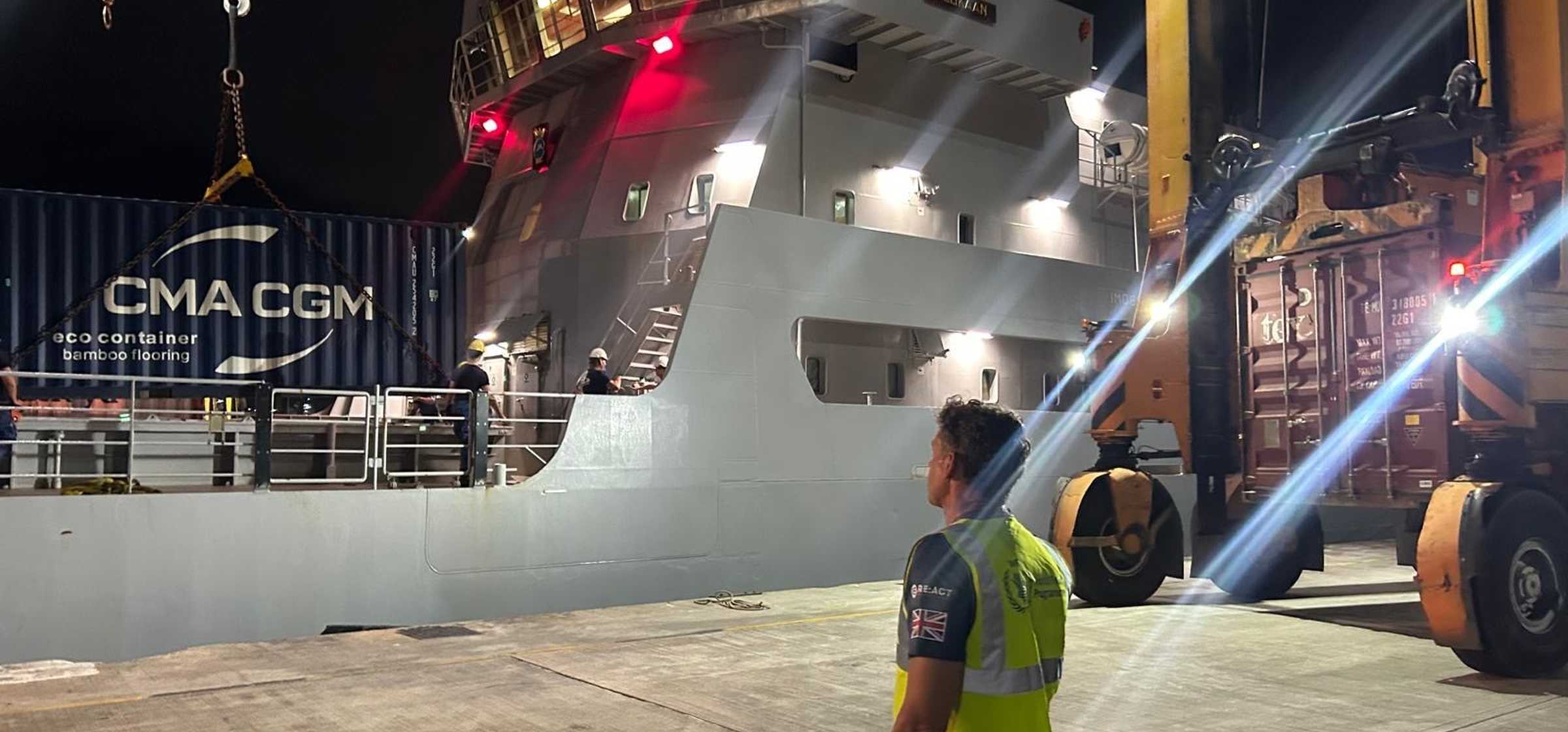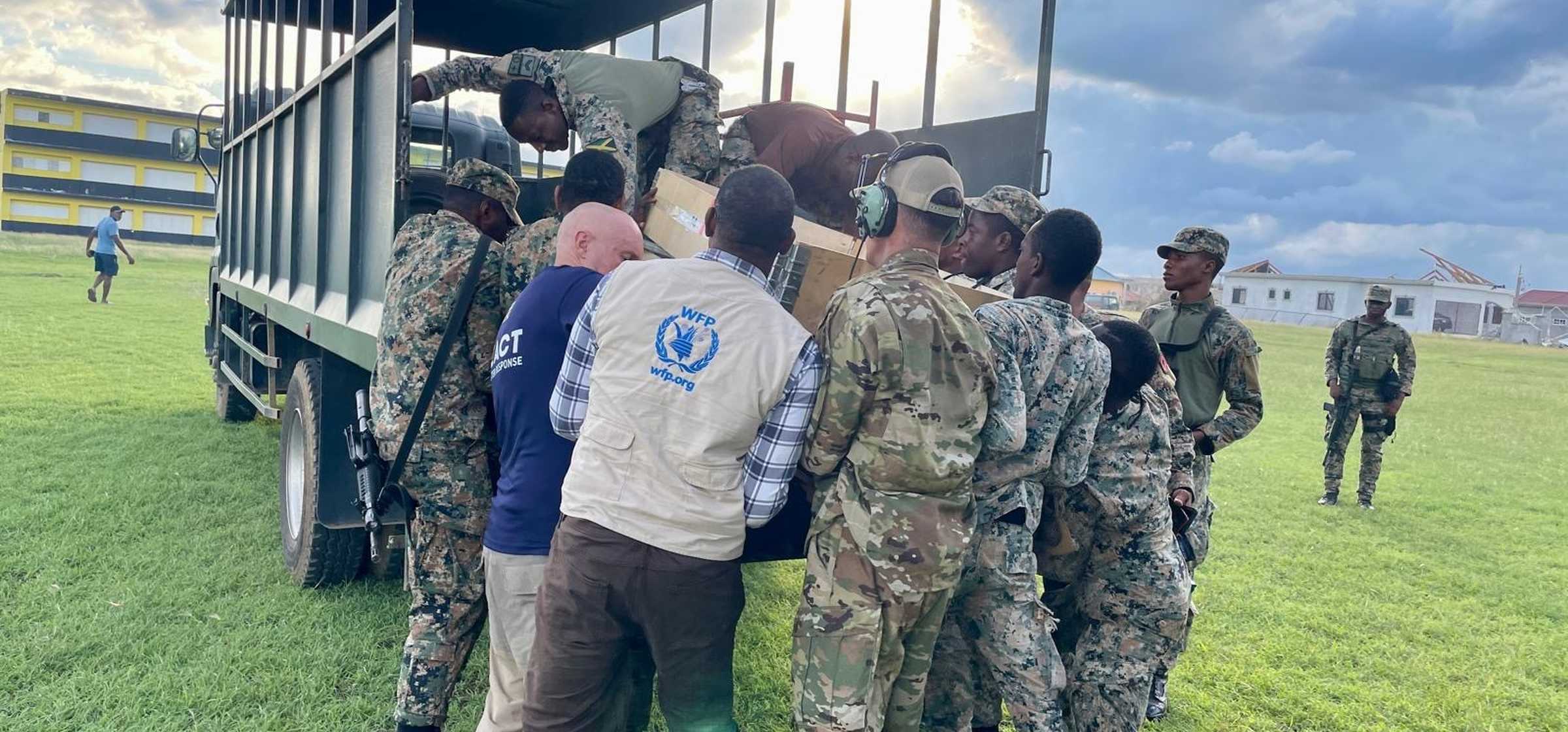Rapid Response in Crisis: REACT Supports Communities Hit by Hurricane Melissa

Posted by Naomi Edler 20th November 2025 News
Estimated Reading Time: 2 mins
On 28 October 2025, Hurricane Melissa tore through Jamaica as a Category 5 storm. It was the strongest the region has seen in over a decade. The impact was devastating. 1.6 million people were affected. 32 lives lost. 116,000 homes damaged. Communities across the island faced an overwhelming crisis.
REACT Responders deployed immediately, arriving on the ground within 24 hours to provide rapid humanitarian assistance where it was needed most.
Speed matters in disaster response
Our reconnaissance team touched down on 29 October, followed swiftly by logistics and support teams. Working under our new UN World Food Programme Standby Partnership, REACT Responders embedded themselves into the humanitarian response network providing the agility and expertise needed during those critical early days.
food kits delivered by helicopter
water bottles delivered to isolated communities
people assisted through REACT supporting WFP / JTF-Bravo air operations
Data supplied by the World Food Programme (WFP). Figures subject to a 48-hour data refresh cycle.
In just ten days, REACT contributed to humanitarian efforts supporting over 100,000 people through logistics and supply operations. We delivered direct food aid to more than 2,000 people in Western Jamaica and helped stabilise supply chains underpinning the entire regional response.
REACT’s approach? Small, agile teams that deploy fast and stay self-sufficient. Three Mobile Support Units are now established in West Jamaica, with more planned as needs evolve.
Partnership drives impact
This deployment marks REACT's first operational mission under our UN WFP Standby Partnership, signed in July 2025. It demonstrates what's possible when organisations combine their strengths. REACT's rapid response capability meeting WFP's global reach and infrastructure has shown combining capabilities can deliver faster support to those who need it most, and improve efficacy in the humanitarian system.
We're working closely with local authorities including the Office of Disaster Preparedness and Emergency Management (ODPEM), the Jamaica Defence Force, and the Caribbean Disaster Emergency Management Agency. This is a locally led response, internationally enabled, exactly as it should be.
Our Responders in action
So far, REACT has contributed approaching 2,000 volunteer hours to this response. Twenty-two Responders have deployed to the Caribbean (54% veteran, 36% female), with 23 more supporting as watchkeepers from the UK (58% veteran, 20% female).
Our teams rotate every two to three weeks, maintaining consistent support through mid-December whilst ensuring our Responders remain effective. Because we're entirely self-sufficient, bringing our own supplies, equipment and expertise, we don't burden host communities or deplete scarce local resources.

What makes REACT different
Operation Melissa showcases the three capabilities that define REACT's approach to humanitarian emergencies:
Rapid deployment and assessment; We provide real-time, high-quality situational awareness that enables smarter decision-making across the humanitarian network.
Targeted humanitarian delivery: Our Response Teams deliver fast, flexible assistance to the hardest to reach and most vulnerable communities.
Coordination and system optimisation: We plug gaps and strengthen collaboration across agencies, ensuring coherence when it matters most.
The early phase is where we make the difference
Hurricane Melissa affected 5 million people across Cuba, Haiti and Jamaica. In those chaotic, volatile first days following disaster, communities need immediate support to prevent being overwhelmed. That's where REACT specialises by plugging critical gaps and bolstering infrastructure during the early phase of an emergency, until conventional relief organisations can respond at scale.
Every pound donated to REACT multiplies impact. It enables faster assistance, stronger coordination, and ultimately, lives saved.
Support our work
REACT Responders are volunteers. They're only called volunteers because they don't get paid, but their skills, training and dedication are exemplary. Your support ensures we can deploy these exceptional people the moment crisis strikes.
